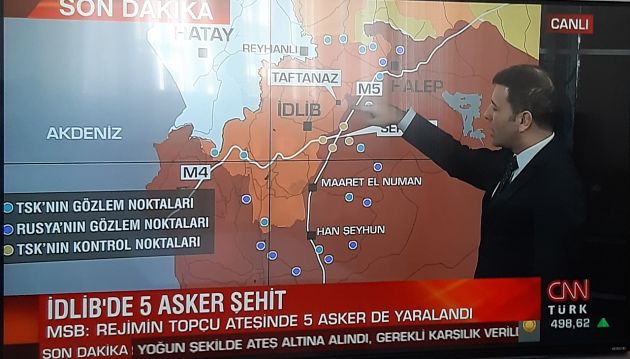The indecisiveness and inconsistency of Recep Tayyip Erdogan’s government in Idlib is threatening him with another loss of face over Syria, not only in the world, especially in the Muslim world, but, more importantly for him, in Turkey itself.
And it is not even about the essence of the Idlib problem and its realistic solution – the establishment of its new border along the M4 highway, where the advance of the regime forces will be stopped, with the remaining territory coming under the control of the Syrian National Army (SNA) and the Turks themselves, as in their other protectorates (Euphrates Shield, Olive Branch and Peace Spring).
The problem is that even if Erdogan succeeds in this (and if not, the loss of face will be even more dramatic), it will still be seen as a humiliation for Turkey, considering how all this happened.
Because in principle, the Turkish leadership, knowing about the advance of the regime forces and without intending to resist them, could have simply withdrawn its troops out of harm’s way. Yes, in the eyes of the Syrian allies this would have looked like betrayal, but their opinions and feelings seem to have long been disregarded by Ankara in the one-sided dependent relationship that allows it to do whatever it wants, whenever it wants.
However, not wanting to suffer any loss of image, the Turkish authorities, without really resisting the regime’s advance, exposed their military to its attacks and thus suffered a loss of reputation in the eyes of those with whom they cannot afford to fall out – the Turkish voters and the army.
Today, for example, five more Turkish soldiers were killed in the attack by Assad’s forces on the newly deployed Turkish contingent in Idlib. This happened after the Turks themselves worked on the Assad forces to stop their advance, but for the Turkish society and military it does not change the essence – another five victims were added to the last five victims of Assad’s attacks. And the only answer is helplessness.
And here it should be understood that the Turkish army is not cannon fodder like the Russian one, with which the Kremlin can afford to do whatever it wants without fearing any consequences. Until recently, the Turkish army ruled the country, and Erdogan’s own power hung by a thread for a long time due to the threat of another military coup, which was unsuccessfully attempted in 2016.
Since then, Erdogan has apparently purged the army of all potentially dangerous elements and replaced them with loyal personnel. However, it is unlikely that its entrepreneurial spirit and self-awareness have completely disappeared.
The same is true of the sentiments within Turkish society, whose dominant ideology is nationalism of various shades: secular and religious, right and left, conservative and liberal. After the coup attempt, Erdogan established his updated power based on an alliance between his Justice and Development Party (AKP) and the Nationalist Movement Party (MHP).
However, as we have shown by analyzing the results of the recent elections in Turkey and the subsequent events in its internal politics, it is difficult for the AKP-MHP coalition to maintain a majority, especially since the Good Party (IYI Party), which split from the MHP and took away some of its votes on the radical-nationalist flank, and the AKP may lose some of its voters after the departure of Ahmet Davutoglu and the establishment of his Future Party.
Moreover, it should be noted that not all nationalists in Turkey support Turkey’s active involvement in Syrian affairs, whether in the form of support for Syrian rebels or the massive presence of Syrian refugees in the country. Such people believe that Erdogan is not fighting for Turkish national interests there, but for his party-religious (“Ikhwan”) project, as he is doing in Libya.
And it has to be said that the fact that the Turkish policy there is accompanied not only by the death of Turkish soldiers, but also by their death without response, which means the humiliation of the Turkish army and its mockery by the Assad regime, only makes such criticism more convincing. And thus it increases the chances of Erdogan’s defeat in fair elections, especially since the army also loses incentives to defend its power.
Of course, the logical question is: how can Erdogan respond to the humiliation of Turkish soldiers by the Assad regime without risking a large-scale conflict with Russia? The Americans recently demonstrated a similar response in Iraq, when they retaliated against increasing attacks on their military by demonstratively eliminating Qasem Soleimani, who was behind the attacks.
There are such figures who could be held responsible for the humiliation of Turkish soldiers by the Assad regime, starting with Assad himself. Either this response should not be selective, but rather massive, targeting Assad’s forces as a whole, which would carry the risk of a new escalation in relations with Russia.
There is, however, a risk that the Turkish authorities will decide to compensate for these losses of reputation by diverting public attention to another enemy – the notorious “Kurds” – and decide to renew the “Operation Peace Spring”. However, it is not certain that such revenge against a weak opponent for humiliation by a strong one will satisfy Turkish society and the army…

